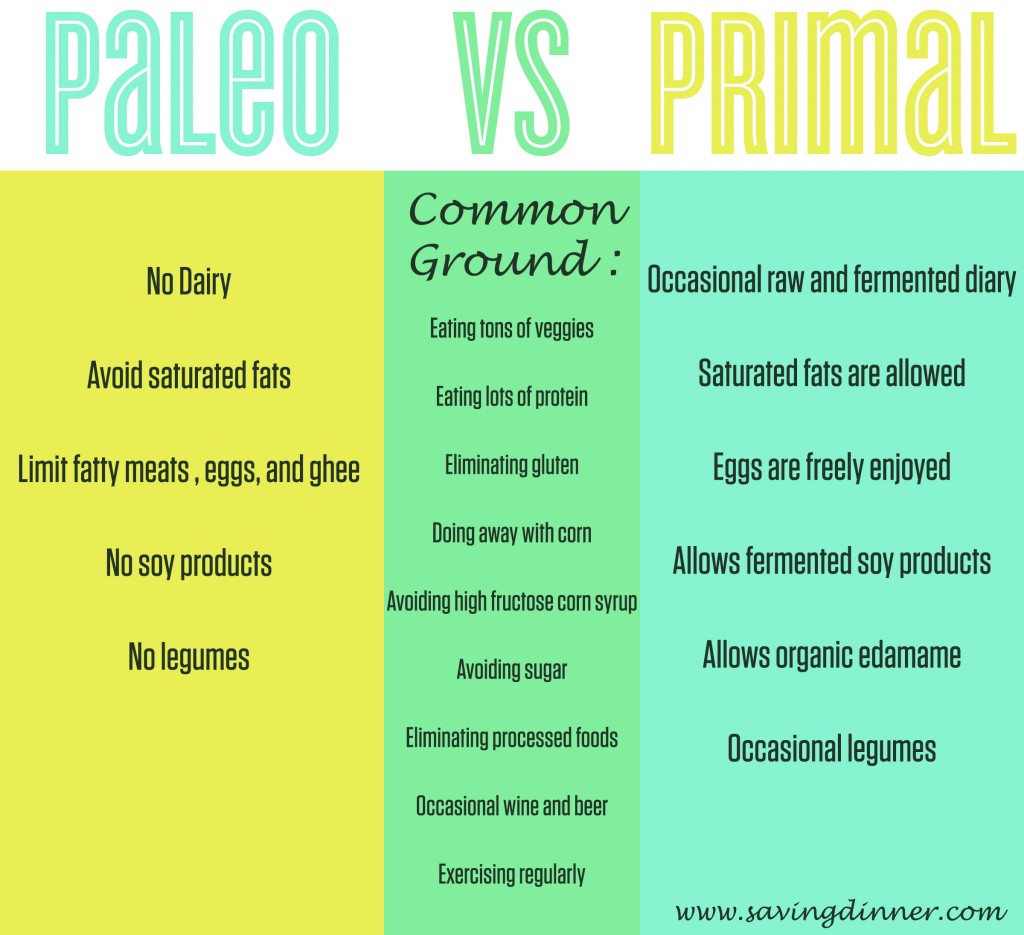By now, you all know that I’m a supporter of the paleo lifestyle. I’ve experienced the benefits myself, so it’s easy for me to get behind this way of eating. If you’ve done any amount of research into paleo, you’ve no doubt come across the word primal along the way.
Perhaps you’ve heard paleo and primal tossed around interchangeably.
The paleo and primal lifestyles are both based on evolutionary science that states that the diet we westerners are eating nowadays is nothing like what our ancestors ate a hundred thousand years ago. That’s because an agricultural revolution took place roughly ten thousand years ago and we started eating food that our bodies couldn’t digest properly. Both the paleo and primal lifestyles say that if we eat what our ancestors ate, we’ll be healthier.

Similarities between paleo and primal lifestyles include:
• Eating tons of veggies
• Eating lots of protein
• Avoiding grains
• Eliminating gluten
• Doing away with corn
• Avoiding high fructose corn syrup
• Avoiding sugar
• Eliminating processed foods
• Enjoying the occasional wine and beer
• Exercising regularly
While they are very much alike, however, paleo and primal have specific rules that differ for each.
Differences between paleo and primal philosophies include:
• Paleoistas avoid dairy (many making an exception for grass-fed butter). Primal folks enjoy raw, fermented dairy once in a while.
• Some paleo folks avoid saturated fats and limit their intake of fatty meats, eggs (6 per day), and butter. I am not one of those folks. I eat plenty of butter, grass-fed beef, and coconut oil! Primal eaters are not afraid of saturated fats, and eggs are enjoyed freely.
• Primal allows fermented soy products and organic edamame, while paleo has its followers avoiding soy.
• Primal allows for occasional intake of legumes, while paleo says no.
Now before you comment and send me nasty messages about how wrong I am about paleo, keep in mind that these are the differences based on the philosophy behind paleo and primal diets. I believe that paleo has evolved a bit over the years, adopting more aspects from the primal way of life. Many paleoistas, for instance, eat fermented dairy and Greek yogurt. I have many paleo pals who also don’t limit the number of eggs they eat. And lots of paleo followers don’t limit the amount of bacon that they eat.
There is a lot of information floating around out there regarding what’s primal and what’s paleo. Depending on which “expert” you follow, you may get some contradictory information. In my experience, everyone who eats this way has their own variation of a caveman-like diet and I say that’s fine! The one thing, though, that everyone agrees on is that it’s real food all the time — no pseudo foods!
Whatever you call this way of eating, I highly recommend following the pillars that both lifestyles have in common. If we were all to do that, America would be a heck of a lot healthier, as far as I’m concerned!
Are you interested in trying delicious paleo recipes? Check out our 10 for the Freezer Paleo eBook Bundle!
4 Responses
All I have to say in looking strictly at this list at the bottom on the article is that the Paleo side reads like a trendy diet specifically trying to cover all its bases by eliminating any food that “may” cause a reaction in some, when I look at Primal I see something that seems more natural, if any one had a problem with one of the items listed such as dairy or legumes then they simply would avoid those things, I guess what I am saying is Primal looks more natural and far less restrictive and dogmatic
Primal is to me a healthier option. Who was around in the caveman years to tell us how healthy they were? It is common sense to eat whole foods not sodium packed prepackaged stuff. It is also common sense to include lean meats, veggies and fruits as well as some complex carbs. I am gluten intolerant, but I do eat some dairy. I eat what works for me and at 52 I have excellent cholesterol levels and I am healthy.
My family and i are basically inbetween. My husband and i both are very lactose intolerant. We also dislike soy products. So thats throws us in the inbetween.